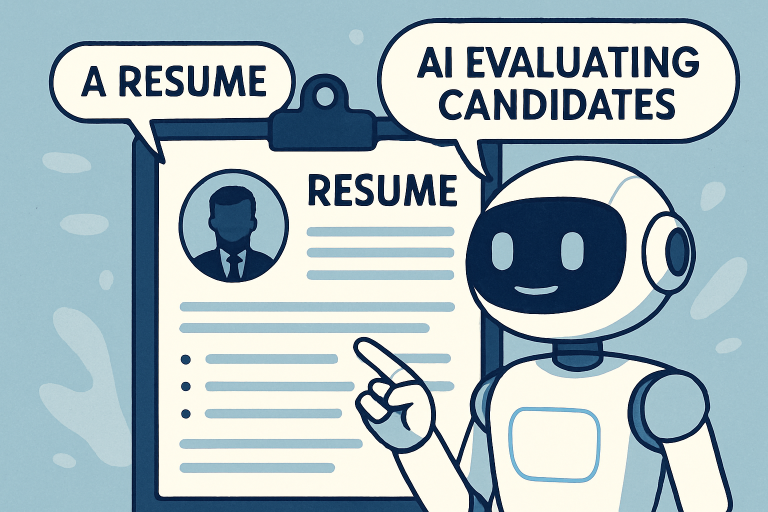As organizations strive for competitive advantage in talent acquisition, artificial intelligence (AI) is transforming traditional recruiting practices. By automating tasks, analyzing candidate data, and improving engagement, AI-powered solutions are enhancing outcomes for both recruiters and job seekers. The role of AI recruiting tools is becoming critical in responding to workforce challenges at scale and with greater objectivity.
AI in recruitment not only speeds up hiring cycles but also helps employers build fairer, data-driven processes. At a time when organizations grapple with high volumes of applications and rising expectations for transparency, AI technology promises greater accuracy and higher candidate satisfaction. However, advancing automation and algorithmic assessment brings a new set of challenges around fairness, data protection, and regulatory compliance.
This article examines the rising impact of AI in hiring, detailing practical benefits, prominent solutions, regulatory changes, and future directions shaping the next era of recruitment.
Introduction
AI has quickly moved from niche pilot programs to mainstream adoption in recruitment. Through machine learning, natural language processing, and automation, modern recruiting platforms conduct tasks ranging from candidate sourcing and resume screening to interview coordination and feedback collection. By offloading repetitive administrative work, these solutions empower hiring teams to focus on strategic talent planning and personal interaction.
AI recruits offer data-driven insights to minimize human bias, ensuring decisions are based on objective criteria rather than personal perceptions. This transformation is shaping not just recruiter efficiency but also candidate experience, inviting more equitable and streamlined journeys for applicants around the globe.
Benefits of AI in Recruitment
Organizations implementing AI in talent acquisition have documented several key advantages:
- Efficiency: Automating processes such as resume parsing, pre-screening, and interview scheduling enables recruiters to handle larger applicant pools more quickly, reducing time-to-hire and administrative burden.
- Bias Reduction: AI evaluates candidates against skills-based criteria, helping organizations reduce unconscious bias and making diversity goals more attainable.
- Improved Candidate Experience: Virtual assistants and conversational chatbots ensure timely updates and immediate support, cultivating a positive impression for every applicant.
Additionally, AI-driven analytics help recruiters track source effectiveness and predict retention, sharpening overall workforce strategies. According to research from Harvard Business Review, organizations using AI for recruitment see improved quality of hire and more efficient assessment of applicant fit.
Challenges and Ethical Considerations
Despite these benefits, the integration of AI in recruitment brings notable challenges:
- Algorithmic Bias: AI systems trained on historical data can duplicate or amplify previous biases if not properly monitored and validated.
- Lack of Transparency: Many candidates are unaware of how AI influences or makes hiring decisions, which can erode trust and raise accountability concerns.
- Data Privacy: With large volumes of sensitive data collected and processed, hiring platforms must adhere to strict data protection standards and regulatory requirements.
Industry leaders and policymakers are urging companies to establish rigorous audit procedures and transparent communication policies to address these ethical considerations.
Notable AI Recruiting Tools
Several platforms are shaping the evolution of smart recruiting:
- Mantrika streamlines the full hiring workflow by leveraging AI to match candidates, automate outreach, and predict job success, resulting in faster, more reliable hiring outcomes.
- Fountain: Designed for high-volume recruiting, Fountain combines AI-based screening and candidate assessments with support for multi-language interaction to ensure structured, unbiased hiring, particularly for frontline roles.
- Paradox: Specializing in conversational AI, Paradox (a Workday company) simplifies applications and quickly schedules interviews, especially useful in industries with large hourly workforces.
Regulatory Landscape
As reliance on AI for hiring accelerates, lawmakers are enacting new standards to ensure fairness and transparency. New York City’s Local Law 144, for instance, requires bias audits and public reporting for AI-based hiring tools. However, debates continue as the law applies mainly to tools that substitute most human decision-making and lack clear thresholds for allowable bias. Experts stress that organizations must go beyond minimum legal standards by developing comprehensive internal policies and conducting frequent audits to maintain accountability.
Future Trends
The future of AI in recruitment will see even deeper technology integration:
- Structuring AI Interviews: Standardized digital interviews conducted by AI aim to eliminate inconsistent scoring, reduce interviewer bias, and increase objective feedback for candidates.
- Seamless ATS Integration: Future Applicant Tracking Systems (ATS) will embed AI natively, transforming them into smart “talent command centers” that uncover hidden talent, recommend personalized outreach, and automate workflow orchestration.
- Skill-Based Evaluation: Emphasizing candidate capabilities, AI will help organizations move away from traditional qualifications and focus on proven, demonstrable skills.
Conclusion
AI recruiting tools are ushering in a new era of efficiency and objectivity in hiring. While automation and data analytics address major challenges in speed and bias reduction, successful adoption requires vigilance regarding transparency, ethics, and regulatory compliance. By staying informed of evolving standards and future advancements, organizations can create recruitment processes that are not only faster and fairer but also more adaptable to the changing demands of the workforce.



Comments